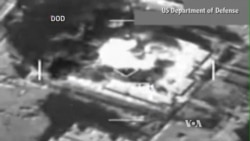As coalition airstrikes hit militant targets in Syria, President Barack Obama's administration is appealing for broader international support of efforts to fight Islamic State terrorists. But analysts say the international coalition that is being assembled by the U.S. could encounter roadblocks as the fight against the militants continues.
Shortly after the U.S. confirmed another round of airstrikes against militant targets in Syria, President Obama appealed at the U.N. General Assembly for more help in the fight against the Islamic State.
“Already, over 40 nations have offered to join this coalition. Today, I ask the world to join in this effort,” said Obama.
But as the growing international coalition gains momentum in its efforts to defeat the militants in Iraq and Syria, the question becomes “what next?” said the Middle East Institute's Daniel Serwer.
“You have to answer the question: 'what next?' What's going to happen once you defeat the Islamic State? Who is going to govern the territory that is liberated from it?” said Serwer.
Serwer said if the U.S.-led coalition can not answer the question of what comes next, it will be answered for them.
“You can expect radicals to appear from someplace who will answer that question. So, it is really important that the United States be thinking around the next corner,” said Serwer,
Another challenge that could emerge in the fight against Islamic militants is that longstanding tensions between some coalition members could cause the international alliance to fray at the seams, said Middle East analyst Michele Dunne.
“At the moment, they've set aside some of those differences - Saudi Arabia and Qatar for example - and everyone is working together, but that is going to be challenging to sustain over the long term,” said Dunne.
As the fight continues, Dunne thinks an important thing the Obama administration can do is show that it is willing to keep focus on the issue, no matter how long it takes.





